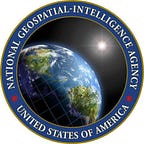Senator: NGA provides ‘edge in a very unstable and dangerous world’
By Jacquelyn Karpovich, NGA Office of Corporate Communications
National Geospatial-Intelligence Agency Director Robert Cardillo testified in an open hearing before members of the U.S. Senate Select Committee on Intelligence in Washington, D.C., Sept. 27, a first for the agency before that committee.
SSCI Chairman, Sen. Richard Burr of North Carolina, noted that the open hearing was an opportunity for the American people to learn more about NGA’s mission.
“We wanted to try to bring a little bit more light about why the American people should care about 17 agencies and the work that they do in keeping America safe and keeping the American people safe and hopefully having an impact around the globe on stability,” said Burr.
The 15-member U.S. Senate committee provides legislative oversight over the intelligence activities of the United States.
The committee queried Cardillo on a range of topics, from new commercial and international partnerships to current outlooks on Iran, China, Syria and Russia.
“Imagery has become a core requirement of many [government] missions,” said SSCI Vice Chairman, Sen. Diane Feinstein of California.
Feinstein detailed NGA’s contributions to monitoring changes in North Korea’s missile program over time, providing imagery to help map militant Islamist defenses around Syrian cities and observing Iranian nuclear site activities. The senator also noted the agency’s domestic support to natural disasters such as flooding and forest fires.
“We, along with policy-makers throughout the government and the rest of the intelligence community, rely on your agency for ground truth,” said Sen. Susan Collins of Maine.
When the committee’s questions turned to Russia’s activities around the Ukraine, it offered an opportunity for Cardillo to highlight the range of geospatial intelligence tools the agency can leverage.
“We have been able to expose, identify and document the geospatial component of the Russian aggression in and around Ukraine,” said Cardillo noting both the use of traditional capabilities to identify the establishment of new, permanent Russian bases on the proximate border with Ukraine and the integration of nontraditional capabilities.
“This is everything from social media to open source to press reporting to identifications we get from allied partners,” said Cardillo.
Commercial partnerships and agile acquisition strategies came up frequently during the open hearing.
Feinstein commended Cardillo for his willingness to pursue new sources of intelligence collection and explore new commercial partnerships.
“In the future, we’ll all have to work together to best position your department and the entire United States government to use as much commercial imagery as possible,” said Feinstein. “While ensuring that we continue to maintain and improve the truly exceptional capabilities offered by our government satellites.”
Sen. Ron Wyden of Oregon echoed Feinstein on the use of commercial imagery and asked Cardillo to expand on the acquisition challenges around procuring these developing commercial capabilities.
“As the commercial industry evolves … we have to become more agile or we’ll not be able to leverage it,” said Cardillo. “So, my direction to my team is to not just engage and explore, but let’s revisit some of the fundamental tenets of our acquisition strategy.”
Sen. Mark Warner of Virginia followed up Wyden’s line of questioning by asking Cardillo if the agency has enough flexibility to balance its acquisition activities between supporting both “exquisite” government systems and commercial-sector innovations.
“There’s more that we can and should do,” said Cardillo. “We’re also working with academic institutions; we’re working with CRADAs — research and development grants with even more companies — because we need to understand the art of the possible … I’m very confident that as we begin to have these small wins turn into medium-size wins, turn in to answers to that military commander’s questions, there will be a momentum that will build.”
The testimony also gave Cardillo the opportunity to detail a little-recognized part of the agency’s disaster response mission, support to combating wildfires.
“In this case, with the forest fires, we do have requests from the National Forest Service and the local and state firefighting services,” said Cardillo in reference to the requirement NGA must be tasked by a lead federal agency for any domestic support. “We are able, because we have that request, to provide them … with a better understanding of not just where the fire is, but how it’s progressing … and that way it can steer and guide the firefighters to employ their resources in the most effective way.”
Burr concluded the hearing by emphasizing the partnership between NGA and the SSCI and applauding the agency’s workforce.
“We are grateful to the employees that 24/7 do an unbelievable job really leveraging the technologies that are available to us,” said Burr. “And, in a lot of cases pushing what’s possible to become reality and give us the edge in a very unstable and dangerous world.”
View NGA Director Robert Cardillo’s written statement for the record before the U.S. Senate Select Committee on Intelligence and watch the video of his testimony.
Like us on Facebook | Follow us on Twitter
About NGA: The National Geospatial-Intelligence Agency delivers world-class geospatial intelligence, or GEOINT, that provides a decisive advantage to warfighters, policymakers, intelligence professionals and first responders. Both an intelligence agency and a combat support agency, NGA fulfills the president’s national security priorities in partnership with the intelligence community and the Department of Defense.
